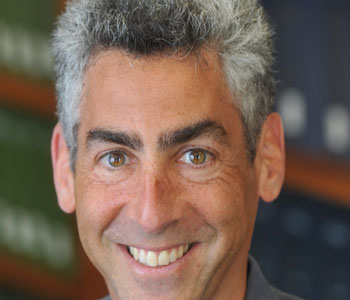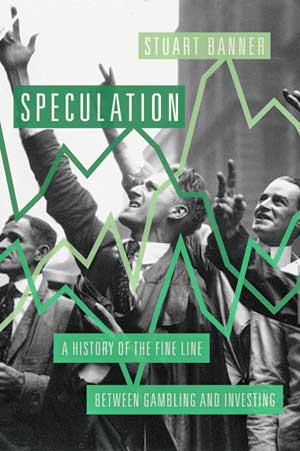
Speculation is about a dilemma that has troubled the legal system for a long time. For centuries, there has been a consensus that investment is necessary and ought to be encouraged. There has also been a near consensus, one that has weakened recently but is still substantial, that gambling is dangerous and ought to be discouraged or even prohibited. But what about speculation?
Speculation lies somewhere between investing and gambling. It has attributes of both. Should speculation be legal? Should it be illegal? Should some kinds be legal and others illegal? Which kinds? Throughout American history (and the history of other places too, but this book is just about the United States), speculation has presented a puzzle to the legal system. To figure out how to treat speculation, we have always needed to distinguish between two kinds of risky commerce, a good kind the law should promote and a bad kind the law should deter. But how should that line be drawn?
My book traces the history of debates on this set of questions, from the crash of 1792 to the present.
In the aftermath of the recent financial crisis, we heard many critiques of speculation for having contributed to the problem, and many defenses of speculation as necessary for robust markets. The thing I found most interesting about this debate was how similar it sounded to the debates that took place after analogous episodes, such as the stock market crash of 1929-32, the sharp fall in commodity prices that took place in the early 1890s, and the recurring panics of the 1800s. The details changed from one era to another, and some of the arguments for and against speculation changed as well, but much of our own debate would have been familiar two centuries ago.
For example, consider these common reactions to the financial crisis: The crisis was caused by overspeculation; the victims included small investors lured by unscrupulous speculators with promises of high returns; and the government should have intervened before prices rose too high. These are familiar sentiments today, but these particular samples are reactions to the financial crisis of 1792. Similar views have been expressed after every market downturn up to the present. They have been countered by equally recurring arguments on the other side.
These continuities suggest that the issue of how the law should handle speculation is not merely a technical question capable of being answered with economic reasoning. It is also a deeply moral and political question. Advances in economics over the past two centuries have narrowed the scope of disagreement over the technical aspects of the issue, at least among well-informed people, but the moral and political aspects of the question are just as open to debate as they ever were.
The book begins with a story that took place during the Civil War. In 1862, the cost of the war forced the government to abandon the gold standard. The “greenback,” the Union paper currency, had previously been fixed at one paper dollar per gold dollar, but once the greenback floated against gold, a speculative market in gold quickly sprang into existence, and the value of the greenback plummeted. By the summer of 1864, a dollar of gold was trading for nearly $2.50 in greenbacks. The Union currency had lost more than half its value. Because the government paid for the war in greenbacks, a weaker currency meant a weaker military.
Abraham Lincoln was just one of many political leaders who blamed speculators for the depreciation of the greenback. He thought they were deliberately driving down the value of the dollar in order to sabotage the war effort. So did Salmon Chase, the Secretary of the Treasury. So did many members of Congress, who quickly enacted a law that prohibited trading in gold futures—that is, contracts for the sale of gold to be delivered at a later date.
The ban on gold futures did nothing to halt the dollar’s slide. As many bankers pointed out, the price of gold was determined by worldwide supply and demand. It could not be influenced for long by a small group of traders in New York. The law’s only effect was to shut down the New York Gold Exchange, which made it harder even for lawful buyers and sellers of gold to find one another. A hastily assembled group of New York merchants traveled to Washington to urge Congress to repeal the gold law. The prohibition of gold futures lasted only two weeks.
In its details, the controversy over gold futures grew out of the unique crisis of the Civil War, but the controversy shared a structure with many other debates that took place in the early republic, and many more that would arise in later years. It required drawing a line between transactions thought to be harmful and those thought to be beneficial, a line between gambling and legitimate commerce. Everyone agreed that gambling was bad and that commerce was necessary. The difficulty was in telling the two apart.
One thing I like about learning history is that it forces us to be a bit more humble about our own points of view. People today express strong opinions about speculation, without seeming to realize that identical opinions have been voiced for centuries, and that for centuries others have found these opinions to be nonsense. The ultimate lesson of Speculation is that the topic is more complex than people tend to acknowledge. What is the difference between investing and gambling? Where exactly is the line that separates good speculation from bad? The point of the book is that these are questions on which people have always disagreed and probably always will.


Stuart Banner is the Norman Abrams Professor of Law at UCLA. Besides Speculation and American Property, featured in his two Rorotoko interviews, he is the author of several other books, including The Death Penalty: An American History, How the Indians Lost Their Land: Law and Power on the Frontier, and Who Owns the Sky? The Struggle to Control Airspace from the Wright Brothers On.